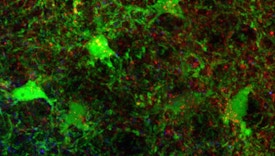
Beat Schwaller obtained his undergraduate degree at the University of Bern, Switzerland, majoring in biochemistry and cell biology. During his postdoctoral stay at the Weizmann Institute in Rehovot, Israel, he became interested in proteins capable of binding calcium ions and consequently affecting intracellular calcium signaling.
As a full professor at the University of Fribourg, Switzerland in the Section of Medicine, Faculty of Science and Medicine, Schwaller’s research is focused on family members of a particular group of cytosolic calcium-binding proteins, sometimes called ‘calcium buffers,’ that belong to the family of EF-hand calcium-binding proteins. These proteins include calretinin, calbindin-D28k and parvalbumin. The latter is best described as intracellular calcium signal modulator, characterized by slow-binding kinetics. The presence of this protein in a subpopulation of interneurons profoundly affects spatiotemporal aspects of calcium signals and subsequently affects short-term modulation of synaptic plasticity. Parvalbumin-expressing interneurons are also involved in mediating brain oscillations, as mice that are null-mutant for the parvalbumin (Pvalb) gene show alterations in this. At the behavioral level, PV-/- and PV+/- mice show social interaction deficits, reduced communication and repetitive behaviors. Investigations on the link between parvalbumin levels and ASD are a major focus of the Schwaller lab.
